
On the surface, this is what Queer as Folk (2022-) on Peacock has in common with Queer as Folk (2000 – 2005) on Showtime: a tall, strikingly handsome queer man who struggles with emotional intimacy but never struggles to get laid. This man being the sperm donor that enables the token not-gay-male couple to give birth in the series’ first episode. This man arriving at the hospital circa the hour of said birth with a 17-year-old he fucked earlier that evening, unaware of said teenager’s age. The teenager falling for the man. The man being friends-since-high-school with one of the new parents. The teenager having an aggressively supportive single Mom. The man somehow being the root of everybody else’s problems. A gay club called Babylon.
What’s different is, of course, everything else. Most notably: a cast that is far more diverse in terms of race, gender identity and ability status. Most unfortunately: the original Queer As Folk somehow secured a 22-episode debut season and the 2022 edition is trying desperately to introduce and develop the same number of characters in eight while boldly opening the series with a first-episode nightclub shooting. Although it’s a deliberate callback to Pulse, this also has echoes of the original: in Season Five, the group hosts a benefit at Babylon with special guest Cyndi Lauper for the fight against Prop 14, which threatens to strip the rights of same-sex-couples, and an anti-gay terrorist plants a bomb in the club that kills seven people and injures 67.
No other reboot has been asked to do so much in so little time: The L Word: Generation Q launched in eight episodes, but was anchored by three established lead characters from the original series — and it too needed more than eight. Gossip Girl got 12. Bel-Air, And Just Like That and Saved by the Bell all got ten and the benefit of familiar characters and/or stories. Eight episodes? Eight episodes is a plot-driven limited series or high-concept HBO detective show, not a character-driven ensemble drama!
Queer as Folk is brimming with promise, exuberance and sex that is both groundbreaking and incredibly hot — and what I found myself wanting from the show was simply more of it: more time to get to know these characters and their backstories. More build-up to unexpected romantic and sexual connections, more history for its central couples, more New Orleans. More of Ruthie’s midriff, Char biting her lip, Noah’s puppy-dog neediness, Brodie and Julian’s family dynamics, Marvin’s whole self. Just like the characters themselves, hungry for belonging and escape and everybody’s deranged habits of self-preservation, I simply wanted… more.
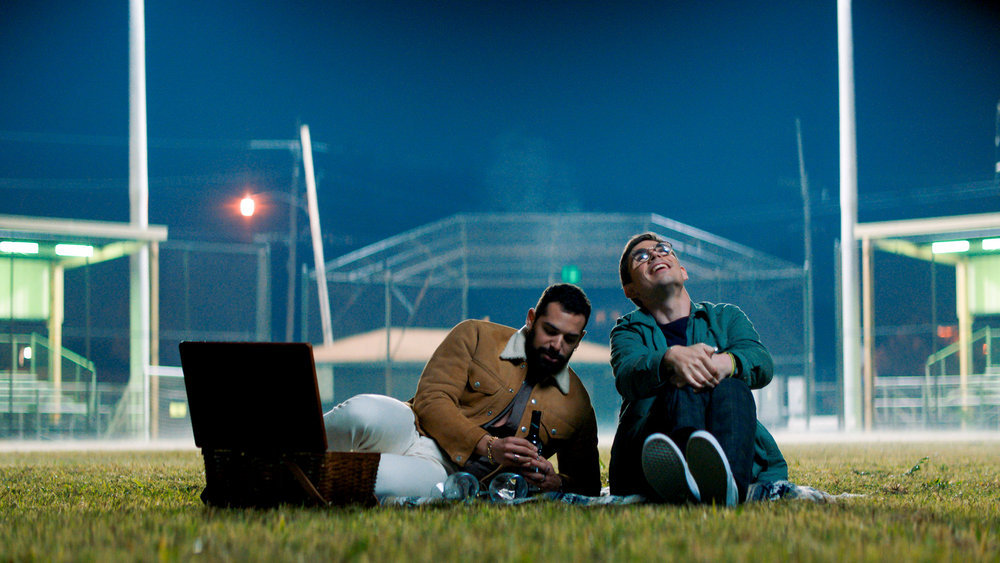
The “re-imagined’ Queer as Folk opens with hot leading man Brodie (Devin Way) back in New Orleans after ditching med school, attempting to reconnect with his old crew as he weaves across the city on his bike: his rich white parents (Kim Catrall and Ed Begley Junior) and brother Julian (Ryan O’Connell), who has cerebral palsy and loves hanging out at the mall; Brodie’s high school bestie Ruthie (Jesse James Keitel), a trans woman, and her nonbinary partner Shar (CG), who is pregnant with twins.
We then meet strapping partner-track lawyer Noah (Johnny Sibilly), the boyfriend Brodie unceremoniously left behind, who has taken up with Brodie’s mesh-adorned best friend Daddius (Chris Renfro) in Brodie’s absence. At Babylon that night, Brodie hooks up with Mingus (Fin Argus), a nonbinary high school student of Ruthie’s whose Mom, Judy (Juliette Lewis) is a Cool Mom. At Babylon, we meet Marvin (Eric Graise), a cynical scenester who knows everyone and uses a wheelchair, and Bussy (Armand Field), a drag queen who runs a New Orleans drag school. It’s during Mingus’s debut drag performance – a delightfully weird tribute to The Craft – that a shooter enters the club and kills and wounds many patrons. Daddius is among the dead.
In interviews, the showrunners have said this was a story they very much wanted to tell. Joél Morales, a crisis responder at Pulse in 2016, was one of a few consultants who worked with QAF on the storyline, and told them.us, “everyone felt like this is a story that needs to be told. What happened at Pulse was real. We shouldn’t hide away from it.”
At times, the queasiness around representing a very real trauma that echoes Pulse seems to prevent the show from leaning entirely into it. But that shared trauma does quick work to bond our disparate characters, setting us off on a heightened course and enabling them to process grief in all its messiness; to intersect with each other in suprising ways; to hone dissociation and, of course, to find ye olde queer resistance and shared joy through chosen family, community and sex. Specifically, the gang rallies to begin hosting parties of their own, called “Ghost Fag,” while Babylon remains deserted.
There really is nothing that defines queer community quite like it’s historical dedication to Throwing Parties When We’re Sad. So much early LGBT activism was centered on nightlife, pushing back against a government opposed to queer people having fun or being sexual together. It’s here that the original series and the reimagined one find an unexpected thematic intersection: “fun” as a gay go-to for resistance, living and fucking unapologetically no matter how shattered our hearts.
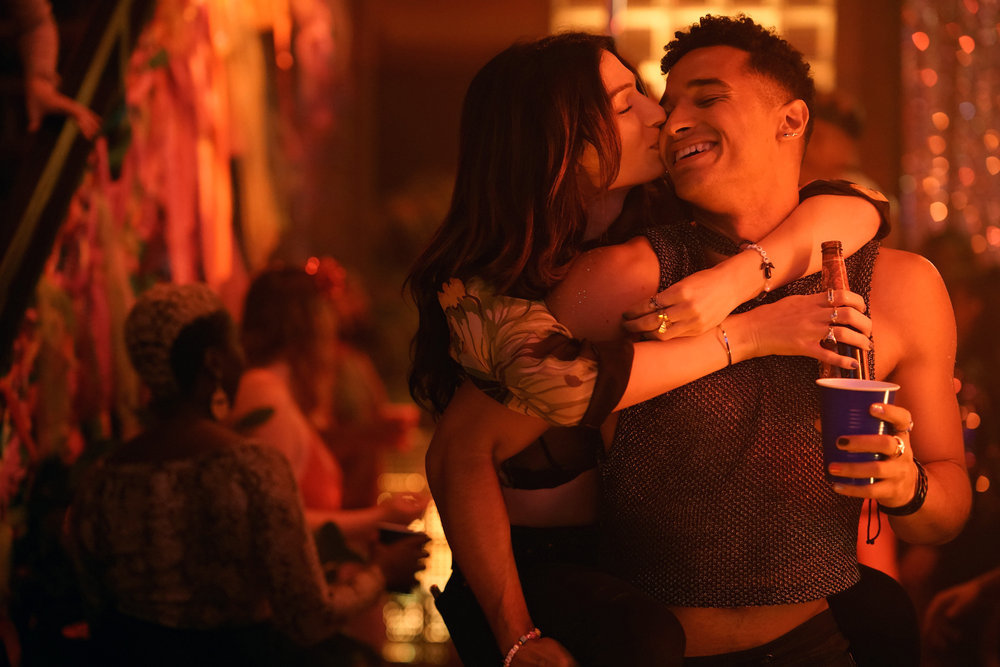
While Showtime’s The L Word and Queer as Folk are often analyzed in the same breath, they were vastly different shows: the former, set in Los Angeles from 2004 – 2009, followed an aspirational group of lesbian and bisexual women whose careers included Movie Producer, Art Gallery Owner, Actress, Chef, Tennis Star and British Heiress. Its political content was relatively light considering its subject matter, preferring instead to dwell on the soapy possibilities afforded to queer residents of West Hollywood, California.
Showtime’s Queer As Folk premiered in 2000 and was ostensibly set in Pittsburgh but filmed entirely in Toronto. They picked Pittsburgh as a suitable parallel to Manchester in the original UK Queer As Folk, but actual Pittsburgh residents didn’t recognize themselves in the story or its portrayal of the city. Brian Kinney, the city’s Top Desirable Gay Male, has a fancy loft and a job at a big ad agency, and lesbian Mom #2 Mel is a lawyer. But the rest are ordinary folks: they work at the Q-Mart (basically, K-Mart), a gay sex store, an accounting firm, a diner. Eventually a college professor is added to the cast, and several main characters venture into small-scale entrepreneurship, like a porn site and a comic book store.
The series was about a lot of things, but mostly it was about sex and homophobia. Even in an idealized Pittsburgh, they are constantly battling against internal and external demons to live and love freely, alternately clinging desperately to each other as family and pushing each other and the world away with cruelty and unspeakable selfishness. In addition to aforementioned bombing, we had a post-prom gay bashing that nearly killed a teenage boy and police disregarding the murder of a gay man. People were closeted at work, venues refused their patronage, they willingly attended conversion therapy, they brought beards to family weddings and preschool auditions, they couldn’t marry each other, their families rejected them, they were unable to be the legal parent of their own child, they were sued out of inheritances left by dead lovers, they were entrapped by cops for cruising in public restrooms, they were targeted by politicians, destroyed by crystal meth and unemployed for standing up against anti-gay candidates. In a pre-PReP era, AIDS was no longer a death sentence but its potential to harm one’s health and the impact of losing an entire generation to AIDS still loomed large. The original series was at once campy and dark, terrible and transcendent, empty and heavy. It also wasn’t simply white, its white characters were often actively racist (anti-Asian racism is a particularly present thread), lesbophobic and transphobic.
In 2022, the world is far kinder to cis white able-bodied gay men, and the new Queer as Folk foregoes them entirely for a set of trans and BIPIOC characters who face their own individual, intersectional battles with the world around them. The only cis white able-bodied gay man with more than five lines is an aspiring influencer who levies his proximity to the shooting into a series of foundations and vigils, unable to resist the urge to center himself in a narrative of oppression that is as appealing to him as it is devastating to those who actually endured it.
It’s a new take on a new era of queer community, one that looks at intra-community micro-aggressions and dynamics beyond the original’s occasional awareness that it was easier to be a super-hot white gay guy than a less hot white gay guy. These are stories that take time to tell.
With such a short season to work with and so little time to establish each character’s individual struggles in a racist, transphobic and ableist society; the shooting does serve as a thematic equalizer that gives the entire cast the same undercurrent of omnipresent shared trauma the original felt rooted in. It’s difficult for me to imagine a Queer as Folk that isn’t centered in defiance against a world that hates us, one that brings us closer as often as it pulls us apart, and as showrunner Stephen Dunn told The Hollywood Reporter in a roundtable with the producers from all three iterations: “It does feel like Queer as Folk has existed in response to the political climate. It reemerges when we need it the most.” Later in the conversation, he recalls that the original Queer as Folk “was just so irreverent, so joyful, so sexual, so free, and it still dealt with the realities of being queer” and shares that when they began sketching out the reboot, “I also went in with a list of stories that we need to hear and tell right now. They’re urgent because I think that’s in the DNA of the series itself.”
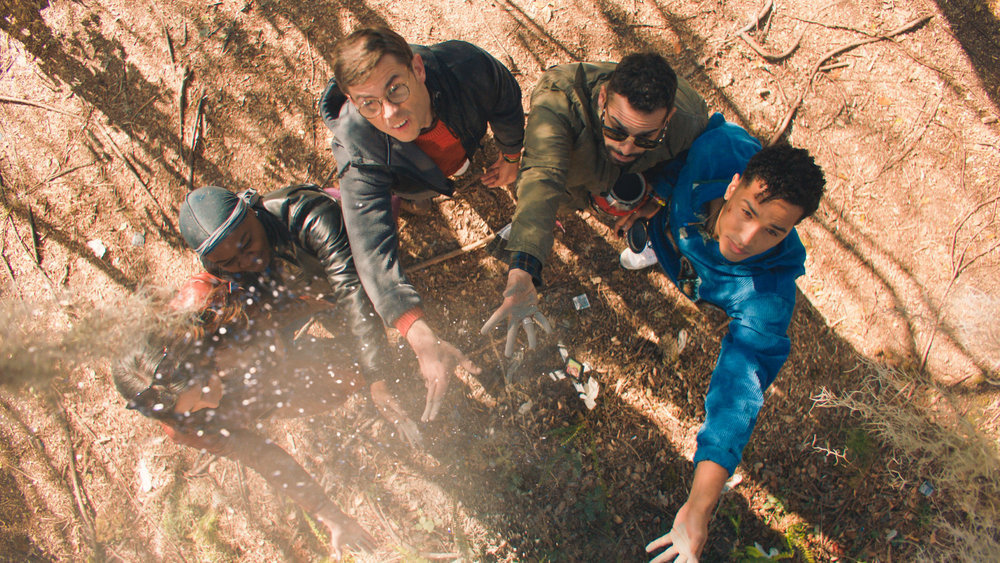
One of the many couples I’d like to spend an additional 14 episodes with are Ruthie and Shar. They are hot and playful and complicated and… a revelation? Executive Producer Jaclyn Moore, a trans woman, co-wrote my favorite episode of the season, “Bleep,” which flashes back between the present day and Brodie and Ruthie’s senior year of high school, during which they were secretly dating while Ruthie was gradually figuring out that she wasn’t the wry and effeminate gay boy Brodie and her classmates pegged her as. Jessie James Keitel (who played a kidnapped sex worker in Big Sky, a TV show which has inspired many rich people to buy massive tracts of land in Montana) told EW, “So often stories about trans people are not told with delicacy. They’re not told with elegance. They’re told from a perspective from a straight cis creator’s narrow understanding of what it means to be trans, what it means to be queer. And so, having a beautiful script written by a trans woman, how could I not feel safe and protected?”
Like the original Queer as Folk’s Lindsay and Mel, Ruthie and Shar have to confront the prospect of parenthood adjacent to a social culture focused on eternal youth, personal freedom and sexual daring; how to bring new life into the world without losing what once defined their own. Shar doesn’t quite get the same level of development as Ruthie – it’s unclear, even, what they do as a job – but what we do see is some of the series’ best work, as they confront the dysphoria of pregnancy and parenthood and struggle with a quasi-reformed party girl co-parent who evades emotional intimacy and can’t seem to resist even the faintest siren song from Brodie’s tornado.This is a place where we needed more time, too – knowing how Ruthie and Shar got together and decided to have kids could add depth to their self-destructive choices as the season marches on. It also feels fitting that Lindsay and Mel had the first lesbian sex scene on American television and now we are seeing Shar and Ruthie fuck in their own underrepresented (and very hot) ways.
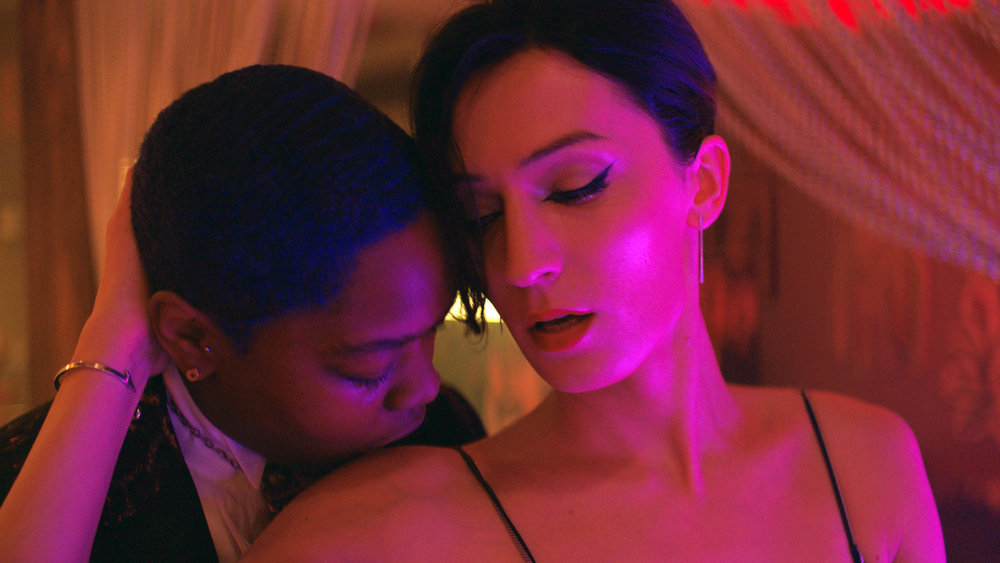
Finally, Queer as Folk’s matter-of-fact inclusion of disabled queer people is unprecedented and has only begun to scratch at its own surface. One episode features a “queer crip orgy” focused on accessibility – the MC has an ASL interpreter for a few lines of party hype, attendants are on-hand to help remove clothing, and sex swings and romper rooms are set up with disabled folks in mind. (But the bar has failed to stock plastic straws, which one attendee points out are necessary for many disabled photos to engage in the queer ritual of drinking.) Julian and Marvin both have romantic storylines, and not with each other. Ryan O’Connell, who plays Julian, is also a co-executive producer and writer for the series, fresh off his time on Special (which is an amazing show you should see if you’ve not yet seen it!). “Very rarely are disabled stories included,” O’Connell told W, “but to have two of us on the show was just incredible.”
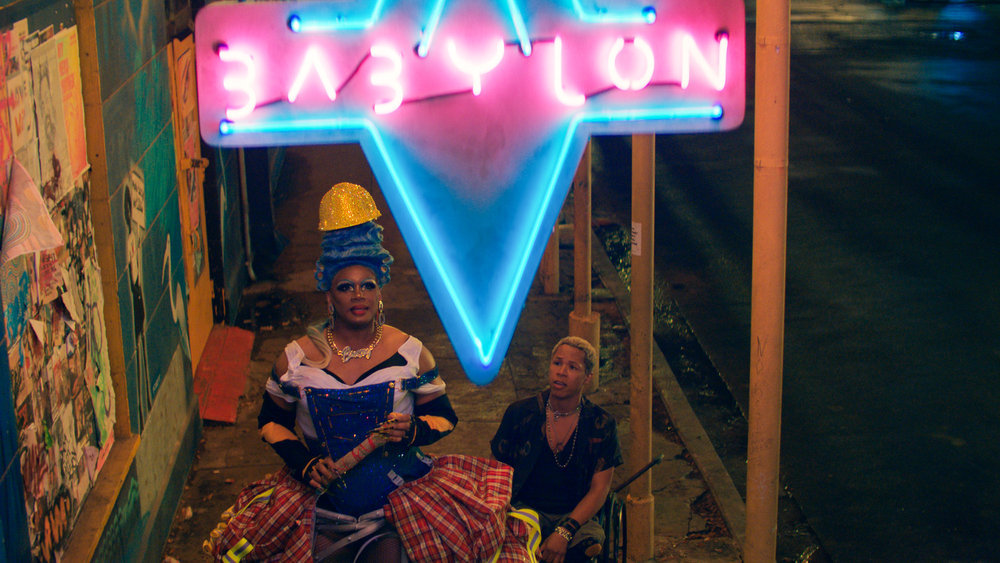
Ultimately, this new Queer As Folk is filled with messy bitches, gay chaos and hot sex; diversity that feels earned and not like box-checking; and a relationship between a trans woman and a non-binary person that I’m rooting for while fearing its untimely demise. An extended season like the original QAF earned is unheard of these days, but for a show that did so much in eight hours, I’d really love to see what they could do with 14.








Comments
Totally agree that it needed more episodes and we needed to see more of Ruthie and Shar’s relationship and why they decided to commit and have kids. The speech Ruthie gives talking about how her desirability /sex was such a big part of their life (and living) before that last sex scene was something I hadn’t considered and was so poignant. And the relationship between Brodie and lawyer daddy needed more fleshing or too. Hell, Brodie and Daddius!
Though who Kim Catrall hooks up with at the end… I was like wtf? Also who makes their kid Mingus?!
definitely, that speech ruthie gave was a highlight of the series for me. i want so much more of that.
and yes i screamed hard at that end-of-season hookup
I would rush home to watch it at 10 every Wednesday night it helped to come out as gay watching the show to my family as I was 34 an still in the closest. I have met some Want wonderful caring and genuine friends for life I’m now age 60 . Thank you for showing me Wht I was missing all those years . We need more programs like this was as it was very close to real life as a gay person x
Eh? I loved QAF the original. I didn’t love it. It needs a Brian and Brodie doesn’t have the sweet allure of Michael
This piece is so well-written that it captured all the reasons why I’ve always been into QAF instead of the L word even if I identified as a lesbian back then. Brian Kinney was all that I wanted to be, for better and for worse. And this reboot definitely didn’t disappoint except, as Riese said, the scarcity of episodes.
yeah brian kinney like… changed my life??? i wanted to be brian kinney too! i’ve been re-watching it recently and wow, i really had forgotten how big of an asshole he is, too. but at the time i admired it because i wanted to be that emotionally detached from life (while, like brian, letting my actual emotions spill out in other ways that could be self-destructive and cruel and passive-aggressive)
and i wanted emmet to be my best friend!! i watched it on netflix dvds for the first time, like in late 2006, and i would be at parties just itching to go home and watch more QAF
You guys make me feel better. I always felt weird that I also wanted to be Brian. And yes he’s an asshole, but I love his monologue on being queer when he’s rejecting Michael’s embrace of marriage. I love his Queerness and defense of it with a capital Q. Iconic
you all wanted to be brian! i wanted to be michael!
ok this makes so much more sense to me than having to identify as a Carrie, Samantha etc.
Hard agree. I could have easily watched 14 more episodes of this. It’s kind of staggering what they were able to accomplish with so many characters and threads in only eight episodes. This show was so incredibly diverse and it never once felt like pandering but rather embedded within the very fabric of the show.
And you’ve totally nailed what I’ve always truly loved about Queer as Folk (all versions of it) which is queer joy as queer resistance! I truly hope we get another season!
Also, Shar and Ruthie had one of the hottest sex scenes I’ve ever seen…like holy hell…
SO HOT
What the new show is lacking is heart, a moral compass, and someone to route for. I don’t find one likable character in the cast. They all do each other wrong and don’t seem to care.
The original show had heart and friendship. The new version is just a bunch of self willed people doing what they want without a bit of regret. I wouldn’t want one of these people as friends.
Sure it’s more inclusive it clicks off every box. Except people who are kind to each other and will stand by their friends. They new show even turns brother against brother. I had high hopes by it was all dashed quickly. Kim Cattrall’s southern accent is so bad. What a awful way to start the show. She wouldn’t do the Sex and the City reboot but does this dreck? Her ego is bigger than her acting ability.
What this show needed was a Deb character. Someone who knew right from wrong and told people to get their act together, a moral compass. Or a Michael who tried to do what was right and kind, a good friend who would have your back. Has times changed that much where this doesn’t exist in gay culture. I hope not but this type of person doesn’t exist in the new Gay as Folk. I don’t know why they choose to go with the original title except to draw previous views in.
Why not just call it Gay and Selfish and call it what it is.
I’m two episodes in but I’m sort of leery of the Ruthie and Shar story line because they literally just had twins. Newborn twins. And they have time to throw a party which the babies do not interupt and find a baby sitter on short notice to go out for the night. And also, they’re not dead to the world exhausted because they have two newborns in the house.
I’m hoping that as i get through the next six episodes we see more queer parenting and less we have newborns when it’s convenient to the plot.
This! Absolutely. I kept thinking: How is it possible that Shar looks this relaxed and peaceful after giving birth to twins? How come Ruthie and Shar are not and do not look incredibly tired all the time, why are they not constantly on their limit or beyond with sleep deprivation and exhaustion? One baby is enough for this, but twin babies… How was the flat so tidy and clean? How did they have time for everything they did and had uninterrupted sex?
I finished the series and this part never got better. My belief is that the people who wrote the show have no idea about early parenthood, its consequences and changes whatsoever. It was a storyline about parents for the sake of a storyline. Shar and Ruthie were parents only in the sense that it was important to the story. But not really parents in terms of what it means to have one’s life altered in this profound and all-encompassing way.
Only three episodes in, this show is proving to be a complete train wreck on every level with absolutely no likeable characters…so I am so thankful it’s only eight episodes.
Hey there, when you wrote “Char biting her lip” might you have meant “Shar biting their lip” or might I have missed another character with truly incredible lip biting scenes? Love the article and agree with everything though, more episodes were for sure needed.
The writer cites the year 2000 American/Canadian series as the “original” but the series debuted on British TV in 1999 with Aiden Gillen as Stuart Jones (“Brian/Brodie”), Craig Kelly as Vince Tyler (“Michael/Noah”) and Charlie Hunnam as Nathan (“Justin/Mingus”.) It–like this newest iteration–ran for an incredibly compact 8 episodes and had a 2 part TV movie follow up in 2000.
The statement, ‘cops bust for cruising in the bathroom’ only happened in the peacock version.
I really one talk about that very last episode, so SPOILERS to everyone that hasn’t watched it.
***SPOILERS***
What the fuck?
Having a trans woman jumping into the arms of a gay man, who has shown not a single inclination to attraction to women/bisexuality anywhere in any of the episodes, that deadnamed her in the last conversation they had and used to be inlove with her when she was still presenting male, what is this mess? Not to mention that said woman has two new babies with her partner! Make it make sense!
What is supposed to be the message here?
And ofcouse my least favorite trope/trend of an unhappy partner deciding adding cheating to our relationship problems is the way to go.
I always like to look at the good in things, but this show made that pretty hard too. Everything is horrible. The fact that people even can write anything good about this is head scratching. Even watching from the viewpoint that this isn’t a queer as folk reboot did not help any.
I’m from south Louisiana and lived In Nola for a few years and seeing one of my favorite cities in the world is the only good I can write about this show unfortunately.
It would be great for the author to acknowledge how the Brodie and Mingus story line is f’d up. Yes the statutory rape law is 17 is Louisiana but still it’s not cute for a grown man to be having a relationship and having sex with a 17 year old who is still in hs. This is such a tired trope and is predatory behavior. This really turned me off from the show
Dear Autostraddle, please write Queer as Folk recaps for each episode! I really love your TV recaps/reviews, and I would be so happy and grateful if you published some on the new QaF series. Much love and appreciation for your work!